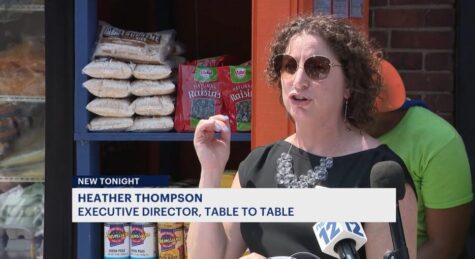United Community Corporation Delivered Food and Stocked the Refrigerator
Newark, NJ—July 17, 2024—Mayor Ras J. Baraka joined United Community Corporation (UCC) today to cut the ribbon to open the Hyatt Center of Hope’s community refrigerator. The Center of Hope is located at 11 Hawkins Court.
UCC partnered with the city and Table to Table to develop the refrigerator food service and made the first delivery to stock it immediately before the event today. Future deliveries will be made by Table to Table.
Attendees included the H.I.P.P. Afterschool Program, the Devils Youth Foundation, Yendor Arts, and more than 30 youth participating in the city’s summer camp program. The Hyatt Center of Hope is currently expanding to address the needs of senior citizens.
“A basic need of human beings is nourishment, both for the body and the soul,” said Mayor Baraka. “By providing this refrigerator and its contents 24/7 to the neighbors here in the East Ward, we meet both needs, as we feed and affirm the value of these residents to our citywide community. Newark is shrinking our food deserts neighborhood by neighborhood, and infusing these areas with healthful meal essentials to build strong, healthy individuals and families, and improve their quality of life.”
UCC is also providing additional staffing and resources for the center, which provides programs to 30 youth during the school year and 34 during the summer.
“With the installation of our seventh community refrigerator, UCC is taking a pivotal step in combating food insecurity in Newark,” said UCC Executive Director Craig Mainor. “Together, we are ensuring that Newark families have reliable access to fresh and nutritious food, reinforcing our commitment to supporting the well-being and resilience of our community. We are grateful for our partnerships with the Center of Hope, Table to Table and Newark Housing Authority to help bring healthy food directly to communities that need it most.”
The UCC Community Refrigerator program is tackling food insecurity head-on with units that are installed across each of Newark’s five wards. UCC YouthBuild students, under the guidance of a construction manager, design, build and install each of the community refrigerator structures. The refrigerators provide residents with around-the-clock access to staple goods such as milk, juice, cheese, fresh fruits and vegetables, all at no cost.
“As a food rescue nonprofit that has been working in New Jersey for 25 years, Table to Table is committed to keeping quality food out of landfills and ensuring that is reaches communities where it’s most needed,” said Table to Table Executive Director Heather Thompson. “Our goal is to get healthy food into neighborhoods as efficiently as possible, and we’re grateful to partner with the City of Newark and UCC on this wonderful initiative, to make sure this refrigerator remains stocked with fresh, nutritious items. We invite residents to volunteer with us to assist with the twice-weekly transports so we can keep our neighbors nourished.”
“I want to thank the Mayor and all those involved in making this day happen,” said East Ward Council Member Michael J. Silva. “It’s a great day for the City and a great day for the East Ward. As Council Member of the East Ward, it is important to make sure that my residents have a quality of life – a meaning a place to live, are safe, but also making sure they have food on the table. Many people are suffering in today’s society with the cost of housing and groceries. Putting a decent meal on the table for their families is sometimes impossible. But today is a prime example of how the City of Newark, with its seventh food refrigerator, is always putting its residents first.”
Food insecurity is an issue that reaches each of Newark’s five wards. In 2022, sections of each ward were designated as “food deserts” by the state Economic Development Authority. A food desert is defined as a region where people have limited access to healthy and affordable food.
“As a parent and a community leader who thrives on success, there is no worse feeling than trying to comfort or care for a child that’s hungry. Did you know that a child that’s hungry has a harder time trying to listen or learn? We are delighted to have this community refrigerator at the Hyatt Court Hope Center location, which encompasses unity, growth, love, compassion, and honor. I look forward to watching this program grow like flowers throughout the City of Newark and I take pride in knowing that children and families will be positively affected by it,” said Ms. Mincey.
The initiative expanded since UCC’s first refrigerator was installed at 106 Ann Street in the city’s East Ward. In addition to the recent launch of the community refrigerator at Hyatt Court, the agency currently operates units in Newark outside Fulton Street Emergency Shelter at 31 Fulton Street, The Village Housing Complex at 332 South 8th Street, La Casa de Don Pedro at its 39 Broadway location, in the Shani Baraka Women’s Center, and at 1916 Springfield Avenue, in Maplewood.
UCC’s community refrigerator program is made possible through the support of various partners including the Devils Youth Foundation, the Office of Faith-Based Initiatives, Wellpoint, the Community FoodBank of New Jersey, MEND, Investors Bank, and the Presbytery of Northeast New Jersey.
Alongside this effort, UCC hosts routine distribution events in the city. Fresh groceries and boxed foods are a staple at any event, while providing other outreach resources.
Related:











